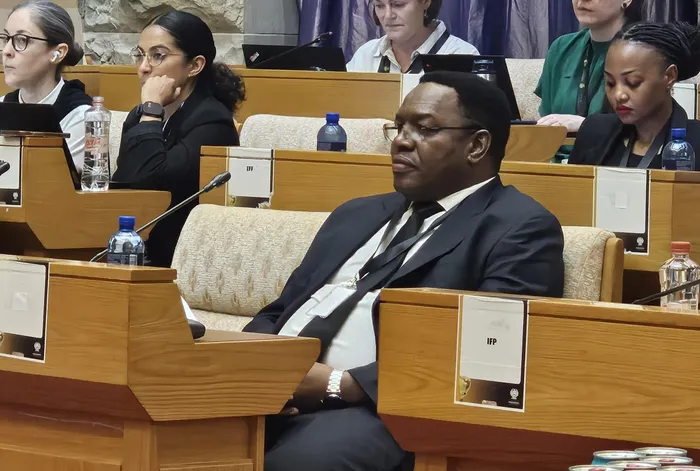
Police National Commissioner Fannie Masemola gives his testimony before the parliamentary inquiry probing allegations made by KZN commissioner Nhlanhla Mkhwanazi.
Image: Theolin Tembo/Independent Newspapers
SAPS National Commissioner, General Fannie Masemola, on Thursday said policing in the country is challenging but it was not in a state of crisis.
Testifying before the parliamentary inquiry probing allegations made by KZN police commissioner, Lieutenant-General Nhlanhla Mkhwanazi, Masemola said high unemployment leads to crime and illegal immigration introduced new types of crimes.
“Policing is under pressure and unfortunately the society looks for everything to the police,” he said.
Masemola also said policing requires new ideas as it has changed since 30 years ago.
“We have a limitation of resources and the population is growing faster than the resources we have.”
Asked by Chief Evidence Leader, Advocate Norman Arendse, SC, whether policing is in a state of crisis, Masemola said: “I would not describe that the police is in a state of crisis.”
He said what you find in the police was what you would find in society, that there were wrongs that need to be rooted out.
“We have not reached a state of crisis,” Masemola said.
Masemola is the second witness to appear before the inquiry that was established to probe the unlawful dissolution of the Political Killings Task Team (PKTT) KTT, the freezing of filling vacancies within Crime Intelligence and alleged corruption by senior leaders in SAPS, public and political interference in the work of SAPS.
Masemola told the inquiry that there were external challenges from society that are infiltrating the police.
“It is, indeed, matters that are worrying and should be rooted out.”
He said they are fixing the problem within the police.
“We do our best to fix them but we need the support of everyone – executive, parliament and society.”
However, Masemola said when trying to fix the problems in the police, they found people twisting the facts.
He also told the inquiry about efforts to fix problems within the Crime Intelligence and that during former Minister Bheki Cele’s term, they had a plan on how to fix it.
Masemola said he unfortunately never had an opportunity to brief Police Minister Senzo Mchunu under the new administration.
Arendse asked whether there have been some improvements since the press briefing by Mkhwanazi on July 6.
In his response, Masemola said there has been improvement in some matters such as the enrolment of cases of the PKTT.
“In the past it would take tremendous effort to get cases enrolled,” he said adding that the team’s members would be shown from pillar to post and nobody was prepared to make a decision on whether to prosecute.
When asked if there were problems within the upper echelons of the SAPS, Masemola confirmed this but said they were not yet beyond resolution.
“They can be resolved.”
mayibongwe.maqhina@inl.co.za
Related Topics: